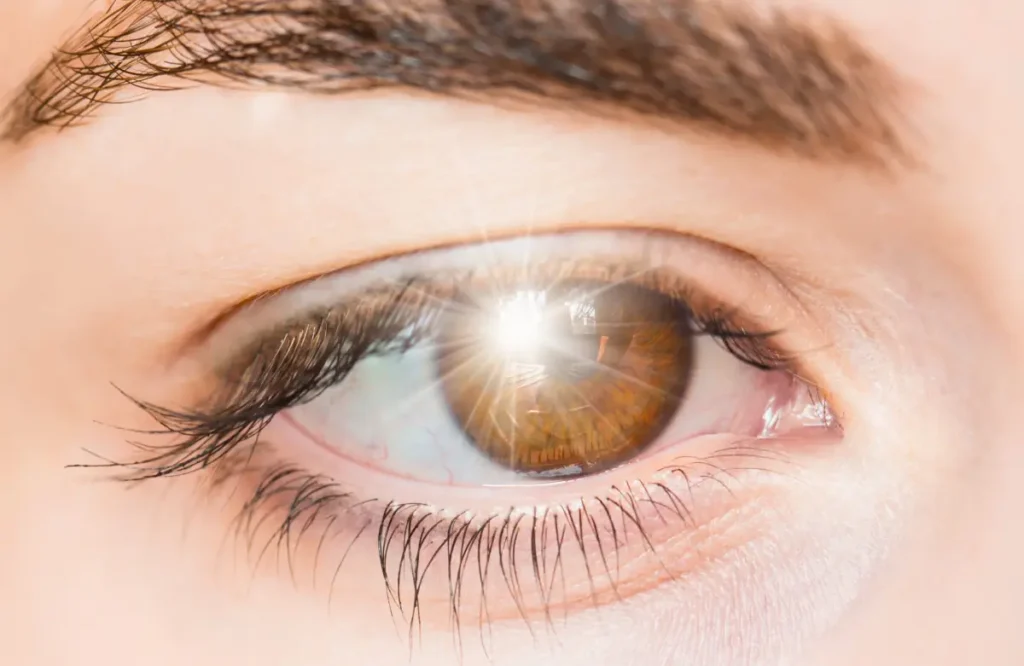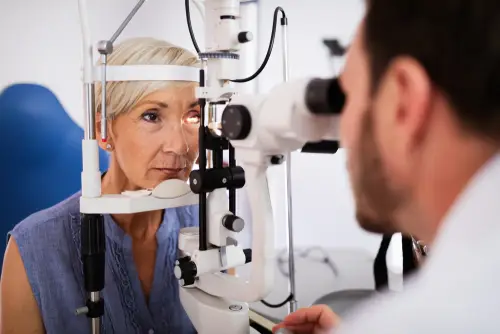Ever noticed weird shapes floating in your vision or sudden flashes of light that seem to come out of nowhere? If you’re nodding yes, you’re not alone. Many of us experience these eye floaters and flashes at some point in our lives. But what exactly are they? Well, in this blog, we’ll explore what they are, explore common causes, and share some tips on how to manage and potentially treat them.
Contents
Understanding Eye Floaters and Flashes
Eye floaters and flashes are common visual phenomena that many people experience at some point. Floaters are small, shadowy shapes that drift through your field of vision. They may appear as dots, circles, lines, or cobwebs and are most noticeable when looking at a plain, bright background like a blue sky or a white wall. Flashes, on the other hand, look like sudden bursts or streaks of light in the corner of your vision. They often occur in low-light situations and can appear intermittently.
Causes of Floaters and Flashes

Floaters and flashes can arise from various conditions:
- Natural Aging Process: As the eye ages, the vitreous humor (the gel-like substance inside the eye) starts to shrink and detach, leading to floaters.
- Posterior Vitreous Detachment (PVD): A common condition where the vitreous gel separates from the retina, often causing floaters and flashes.
- Retinal Detachment: A serious condition where the retina peels away from its underlying layer, necessitating urgent medical care.
- Retinal Tear: This can lead to retinal detachment if not treated promptly and often presents with sudden increases in floaters and flashes.
- Inflammation in the Eye: Conditions like uveitis can cause floaters due to inflammation and debris in the vitreous.
- Bleeding in the Eye: Vascular issues or injuries can cause bleeding inside the eye, leading to visible floaters.
Understanding these causes and recognizing the symptoms early can help in addressing potential eye health issues effectively, ensuring timely treatment and management.
What Age Do Eye Flashes Start?
Eye flashes can start at any age but are most commonly associated with middle to older age groups, typically beginning around the age of 50 or older. This is largely due to the natural aging process of the eye, particularly a condition known as posterior vitreous detachment (PVD), which tends to occur as the vitreous humor inside the eye shrinks and pulls away from the retina.
While eye flashes can sometimes be seen by younger individuals, especially those who are nearsighted or have suffered from trauma to the eye, the likelihood increases with age.
Do Floaters or Flashes Occur in Just One Eye, or Both At The Same Time?

- Floaters are commonly seen in one eye at a time, especially if they’re caused by changes within the vitreous of that specific eye, such as posterior vitreous detachment. However, it’s possible for both eyes to develop floaters independently, each due to changes or debris within the vitreous humor of the respective eye.
- Flashes also typically appear in one eye at a time when they are related to the traction of the vitreous gel on the retina of that particular eye. If the vitreous pulls or tugs on the retina, it can cause the sensation of flashing lights in only the affected eye.
In some cases, especially where vascular issues or migraines are involved, flashes might appear to occur in both eyes simultaneously. Migraines, in particular, can cause visual phenomena known as aura, which can include flashing lights and affects the vision in both eyes due to its neurological origin.
If you experience floaters or flashes, whether in one eye or both, it’s important to observe how they behave and seek medical evaluation to ensure they are not signs of more serious issues like retinal detachment or other retinal complications.
How To Treat Floaters & Flashes?

Here’s a guide to understanding the treatment options and practical tips for managing discomfort:
Treatment Options:
- Monitoring: In many cases, especially with benign floaters and flashes due to aging or posterior vitreous detachment, no specific treatment is necessary other than regular monitoring.
- Medication: If floaters and flashes are caused by inflammation or infection in the eye, appropriate medications, such as anti-inflammatory drops or antibiotics, may be prescribed.
- Laser Therapy: For persistent floaters that significantly impair vision, laser vitreolysis can be performed.
- Vitrectomy: In severe cases, particularly if floaters and flashes are due to vitreous hemorrhage or retinal detachment, a vitrectomy may be necessary.
Home Remedies and Management Tips:
- Reduce Eye Strain: Adjust lighting conditions when reading or working to ensure your environment is well-lit. This can help minimize the visibility of floaters.
- Use Sunglasses: When outdoors, wear sunglasses to reduce glare, which can exacerbate the visibility of floaters and sensitivity from flashes.
- Take Breaks: If you spend long periods on visual tasks, especially on screens, take regular breaks to rest your eyes. The 20-20-20 rule (every 20 minutes, look at something 20 feet away for 20 seconds) can be particularly helpful.
- Anti-reflective Lenses: If you wear glasses, consider lenses with an anti-reflective coating to reduce glare, which can help if you experience flashes.
- Maintain a Healthy Diet: Ensure your diet is rich in vitamins and minerals that support eye health, particularly vitamins C and E, zinc, and omega-3 fatty acids.
While home remedies can help manage symptoms, they are not a cure for the underlying causes of floaters and flashes. If you experience a sudden increase in floaters or flashes, seek immediate medical attention, as these can be signs of a retinal detachment, which requires urgent treatment to prevent permanent vision loss.
Conclusion
If you’re experiencing symptoms like floaters or flashes, it’s crucial not to ignore them. While they are often harmless, they can sometimes signal more serious eye conditions that might require immediate attention.
At the EyeMantra Foundation, our team of expert eye care professionals is ready to provide comprehensive evaluations and personalized treatment plans tailored to your specific needs.
Don’t wait—call us at +91 9711116605 to Book your free appointment now!
FAQs
What vitamin gets rid of floaters?
While no vitamin can eliminate floaters completely, certain nutrients can help maintain eye health and possibly prevent worsening of floaters. Vitamins C and E, as well as zinc and the antioxidants found in green leafy vegetables, are often recommended for overall eye health. However, it’s important to consult with an eye care professional for personalized advice.
Do eye drops help floaters?
Over-the-counter eye drops typically do not help with floaters unless they are specifically prescribed for underlying conditions causing inflammation. Floaters are inside the vitreous gel of the eye and thus not reachable by eye drops. If inflammation is contributing to the increase in floaters, treating the inflammation may help.
How do you know if eye flashes are serious?
Eye flashes may be serious if they suddenly become more frequent or intense, or if they appear alongside new floaters or a shadow or curtain obstructing part of your vision. These symptoms could indicate retinal detachment, which is an emergency situation requiring immediate medical attention.
How long do eye floaters last?
The duration of eye floaters varies depending on their cause. Many floaters gradually become less noticeable or bothersome over weeks to months as the brain adapts to their presence. However, some floaters may persist for a long time. It’s important to monitor their progression and discuss changes with your eye doctor during regular check-ups.
